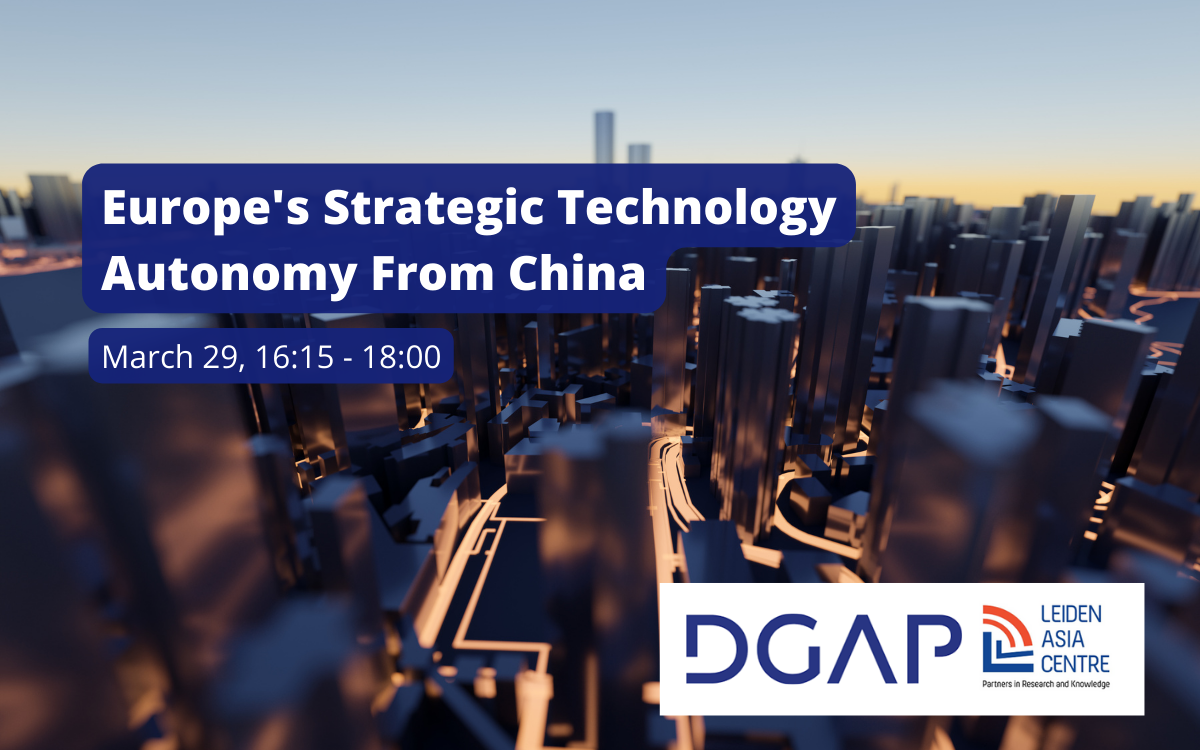China is striving for technological leadership in a broad range of emerging and foundational technologies. This has consequences for the European Union, especially considering the EU is reliant on China for some of these critical technologies. This dependence creates risks for the EU, as China is becoming more assertive in pursuing its own interests, occasionally at the expense of other countries.
The European Union (EU) is attempting to manage its capacities and its dependencies on China. It defines this as Open Strategic Autonomy, where the goal is to uphold the EU’s capability to act internationally without being constrained by technological dependencies.
On this topic, the ‘Digital Power China’ research consortium, a gathering of China experts and engineers based in eight European research institutions, universities, think tanks and consultancies, has written an extensive report. For our upcoming event we have invited four of the contributing authors to discuss dependencies in for example the car manufacturing industry, blockchain, and 6G technology.
Rogier Creemers is a Lecturer in Modern Chinese Studies. With a background in Sinology and International Relations, and a PhD in Law, his research focuses on Chinese domestic digital technology policy, as well as China’s growing importance in global digital affairs. He is the principal investigator of the NWO Vidi Project “The Smart State: Big Data, Artificial Intelligence and the Law in China”. For the LeidenAsiaCentre, he directs a project on China and global cybersecurity, funded by the Dutch Ministry of Foreign Affairs. He is also a co-founder of DigiChina, a joint initiative with Stanford University and New America.
Tim Rühlig is a Senior Research Fellow, Center for Geopolitics, Geoeconomics, and Technology at the German Council on Foreign Relations (DGAP). He investigates the growth of China’s power as the country’s footprint in digital technology increases. He will continue the research on technical standardization, wireless infrastructure, and the digitalization of seaports that he conducted in his previous position with the Swedish Institute of International Affairs from 2018 to 2021. Rühlig also coordinates the working group on high technology and innovation of the “China in Europe Research Network” (CHERN), an EU Cost Action.
Frans-Paul van der Putten is a Netherlands-based independent researcher and consultant on China and geopolitics. He has non-employee affiliations with the Clingendael Institute (as a senior research Associate and LeidenAsiaCentre as a Researcher. His area of expertise is the geopolitical role of China. He is the author of De Wederopstanding van China: Van prooi tot wereldmacht (The Resurrection of China: A geopolitical history of China from 1840), and the coordinating editor of Silk Road Headlines, a weekly newsletter on China’s Belt and Road Initiative.
Sanne van der Lugt is an academic researcher with a focus on the consequences of China’s re-emergence as a global power for Europe. Her research interests are Chinese economic activities in Africa, the digital silk road and China’s position in the fourth industrial revolution. She has also led and conducted fieldwork in many African countries and regions in China. Some of her research has been commissioned by Oxfam, WWF and the European Commission. She has experience with running a business in China, and provided training and advice for European and Chinese companies and government organizations in dealing with respectively European and Chinese business cultures.



